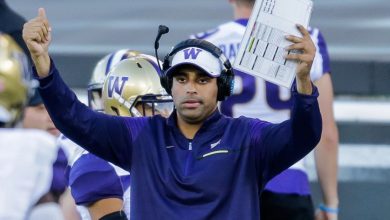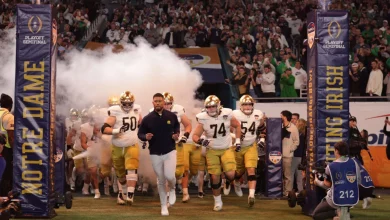The Kansas City Chiefs are not expected to franchise tag former Tennessee Volunteer, Trey Smith, as contract talks continue.

As the NFL offseason unfolds, decisions regarding franchise tags and contract extensions are crucial for teams looking to maintain roster stability or secure future talent. One of the names in the spotlight this offseason is Trey Smith, the former Tennessee Volunteer and current Kansas City Chiefs offensive lineman. Smith, who has made significant strides since joining the NFL as a late-round draft pick, is heading into the final stages of his rookie contract, and the Chiefs have an important decision to make about his future.
Reports have surfaced that the Chiefs are not expected to use the franchise tag on Smith, which would allow the team to secure his services for another season at a predetermined salary. Instead, Kansas City appears to be opting for a different approach as contract negotiations continue. While the decision not to franchise tag Smith might raise some eyebrows, it speaks to the larger context of the Chiefs’ cap management and their strategy for building a competitive roster.
In this article, we will explore the reasons behind the Chiefs’ decision to not franchise tag Smith, what this means for the player, and how it fits into the broader narrative of the team’s offseason strategy. Additionally, we will dive into Trey Smith’s journey from Tennessee to the NFL, his development as a key player for the Chiefs, and what his future might hold as the team looks to secure its long-term goals.
Trey Smith’s Journey from Tennessee to the NFL
Trey Smith’s rise to prominence in football is a testament to his perseverance and his commitment to overcoming adversity. Born and raised in Jackson, Tennessee, Smith’s talent was evident from an early age. As a high school player, Smith garnered attention for his size, athleticism, and strength, which earned him a place among the top recruits in the country. He ultimately chose to play college football at the University of Tennessee, where he immediately became a key figure on the Vols’ offensive line.
During his time at Tennessee, Smith quickly established himself as one of the top offensive linemen in the SEC. He started all 13 games as a freshman and continued to be a dominant force on the Vols’ offensive line throughout his college career. Smith’s leadership and experience were critical in protecting the quarterback and creating running lanes for Tennessee’s offensive attack.
However, Smith’s journey was not without challenges. He was diagnosed with blood clots in his lungs during his college career, a medical issue that raised concerns about his long-term health and future in football. Despite this setback, Smith fought through the medical issue and was eventually cleared to continue playing. His resilience and determination to push through adversity only added to his reputation as a tough, gritty player.
Smith’s career at Tennessee culminated in a standout senior season, where he earned multiple accolades, including All-SEC honors. Despite the medical concerns, his talent and potential were clear, and he entered the 2021 NFL Draft with a promising future ahead. He was selected by the Kansas City Chiefs in the sixth round, a pick that many analysts viewed as a steal given his ability and upside.
Trey Smith’s Impact with the Kansas City Chiefs
Since being drafted by the Chiefs, Trey Smith has quickly made a name for himself as a vital member of the team’s offensive line. Despite being a relatively late-round pick, Smith immediately stepped into a starting role in Kansas City and has earned the trust of the coaching staff and quarterback Patrick Mahomes.
Smith’s versatility, size, and strength have allowed him to excel at multiple positions along the offensive line, including guard and tackle. In his first season with the Chiefs, Smith displayed his ability to dominate in both the running game and pass protection, becoming a staple of an offensive line that plays a significant role in Kansas City’s high-powered offense.
Smith’s performance as a rookie was particularly impressive, as he was able to contribute immediately to a team that was competing for a Super Bowl appearance. His ability to keep Mahomes clean in the pocket and open up running lanes for the Chiefs’ dynamic backfield proved invaluable. In the years that followed, Smith’s consistency and growth in his technical skills made him a key piece of the offensive line, and he became one of the Chiefs’ most reliable players.
The Chiefs have a high standard when it comes to protecting Mahomes and providing him with the time and space he needs to operate their high-flying offense. Smith has more than lived up to that standard, and his performance has been a key reason why the Chiefs have been able to maintain their dominance in the AFC.
Why the Chiefs Are Not Expected to Franchise Tag Smith
The decision to not franchise tag Trey Smith has sparked discussion among fans and analysts alike. The franchise tag is a tool that teams can use to lock up players for another season by offering them a one-year contract at a set salary. This salary is typically based on the average of the top five salaries at a player’s position or a predetermined amount set by the NFL. The franchise tag provides teams with a mechanism to retain players who are key to their roster without committing to a long-term contract.
For a player like Smith, who has proven to be a valuable starter on the offensive line, the decision not to franchise tag him might seem surprising. After all, the Chiefs could have used the tag to ensure that Smith would remain with the team for another year while they continue negotiations for a long-term deal. However, there are several reasons why the Chiefs might choose to forgo the franchise tag in favor of other options.
1. Salary Cap Management
One of the primary reasons the Chiefs are not expected to franchise tag Smith is the team’s salary cap situation. The NFL salary cap is a constantly evolving dynamic that requires teams to make difficult decisions to balance their finances while maintaining a competitive roster. Kansas City, like many other teams, is in a situation where they need to manage their cap space carefully, especially as they continue to pay a premium for star players like Patrick Mahomes, Travis Kelce, and Chris Jones.
By not using the franchise tag on Smith, the Chiefs can avoid committing a significant portion of their cap space to a one-year deal. This allows them to preserve more flexibility as they look to make other moves, whether it’s signing free agents, extending other key players, or managing the long-term contract of their star quarterback.
2. Long-Term Contract Negotiations
Another reason the Chiefs are not expected to franchise tag Smith is that they may prefer to work out a long-term contract extension with him. Given his importance to the team’s offensive line, the Chiefs likely want to ensure that Smith remains with the team for the long haul. The best way to do this is through a multi-year deal that provides security for both the player and the team.
Negotiating a long-term contract could provide both sides with greater stability. For Smith, it would ensure his future with the Chiefs and offer him financial security. For Kansas City, it would allow them to lock up a key player at a reasonable rate before his value increases further. While a franchise tag would give the team an additional year of control, it would not allow for the same long-term stability that an extension could provide.
3. The Risks of the Franchise Tag
While the franchise tag is a useful tool for teams looking to retain key players, it also comes with risks. The franchise tag typically carries a hefty salary figure, and if the player does not perform as expected, the team can be left with a high salary cap hit without the player living up to the investment. For the Chiefs, committing to a high franchise tag figure for Smith could be seen as a risky move, especially if they feel confident in their ability to work out a long-term deal that could offer more cap flexibility.
Additionally, using the franchise tag does not guarantee that the player will remain with the team long term. If a player is unhappy with the tag or feels that the team is not committed to them, it can create friction and disrupt the relationship between the player and the organization. By not using the tag on Smith, the Chiefs have more room to negotiate a deal that benefits both sides and keeps the lines of communication open.
What’s Next for Trey Smith?
As the offseason progresses, Trey Smith’s future with the Kansas City Chiefs is still being determined. While he may not be franchise-tagged, it’s clear that the Chiefs value Smith as a critical piece of their offensive line. The team will likely continue working on a long-term extension that ensures Smith remains with Kansas City for the foreseeable future.
For Smith, this offseason represents an opportunity to secure his financial future and continue his growth as one of the NFL’s top offensive linemen. After proving himself in the NFL, he will likely be seeking a contract that reflects his value and the role he plays for the Chiefs. Whether it’s through a long-term extension or negotiations for a bigger role in the coming seasons, Smith’s future in Kansas City looks bright.









